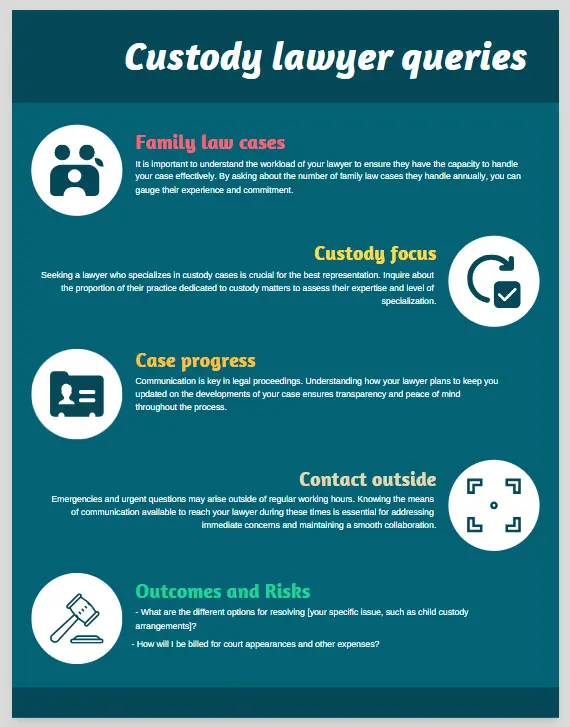Questions to ask a custody lawyer during Consultation!
When facing a family law issue, such as divorce or child custody, being well-prepared for your family law attorney consultation is crucial. Asking insightful questions helps ensure you find the right lawyer for your case. This guide provides a roadmap of key Questions to ask a custody lawyer during consultation to help you make an informed decision.
Table of Contents
Understanding Your Situation and Goals
Expertise and Experience
Understanding a lawyer’s experience is vital for your case. Ask questions to gauge their expertise in handling cases similar to yours:
– How many family law cases do you handle each year?
– What percentage of your practice focuses on [your specific legal issue, such as divorce or child custody]?
These questions will help you gauge the lawyer’s familiarity with your type of case and their ability to run the legal complexities effectively. For instance, if you’re dealing with a divorce, inquire about their experience with spousal support, child support, property division, prenuptial agreements, and alimony.
Communication Style and Availability
Effective communication is essential in legal matters, especially in sensitive family law cases. Assess the lawyer’s communication style and availability by asking:
– How will you keep me informed about the progress of my case?
– How can I reach you if I have questions outside of office hours?
Knowing how and when you can contact your lawyer ensures you stay informed and can address urgent concerns promptly. Consider asking about virtual family lawyer consultations if you have a busy schedule or prefer remote meetings.
Related Articles For You:
Facing Child Custody? Questions to ask a custody lawyer during consultation
What Can Be Used Against You in Child Custody Battles?
What do judges look for in child custody cases
The Legal Process and Potential Outcomes
Timeline and Process Overview
Understanding the legal process and its timeline helps set realistic expectations. Ask the following questions:
– What is the typical timeframe for resolving a case like mine?
– What are the different stages of the legal process?
A knowledgeable lawyer should be able to provide you with a comprehensive overview of the legal journey, setting realistic expectations from the outset. For example, if you are dealing with child custody, understanding the custody arrangements, visitation rights, and potential child support modifications can be crucial.

Potential Outcomes and Risks
Every legal case has potential outcomes and associated risks. It’s important to explore these with your lawyer:
– What are the different options for resolving [your specific issue, such as child custody arrangements]?
– What are the potential financial implications of [your case type, such as a divorce] in [your state]?
By addressing these questions, the lawyer can help you weigh the pros and cons of various legal strategies and prepare you for the potential consequences. For domestic violence cases, ask about restraining orders, protection orders, and working with a domestic violence attorney.
Fees and Costs
Fee Structure and Billing Practices
Legal fees can vary significantly, so it’s essential to understand a lawyer’s fee structure and billing practices. Ask questions like:
– What is your hourly rate?
– Do you offer any flat fees for specific services?
– How will I be billed for court appearances and other expenses?
Clarity on fees and costs upfront can help you budget accordingly and avoid any surprises down the line. Don’t forget to inquire about the cost of family lawyer consultations and whether they offer free family law consultations or flexible payment plans.
Additional Considerations
Building Trust and Rapport
Choosing a family lawyer involves more than just their legal expertise. You’ll want to work with someone you feel comfortable with and can build a trusting relationship with. Consider asking:
– What is your philosophy on handling family law cases?
– Do you have experience working with clients in similar situations to mine?
These questions can shed light on the lawyer’s approach and their ability to understand and empathize with your unique circumstances. If you are considering adoption, ask about their experience with the adoption process, types of adoption, and adoption home studies.

Alternatives to Litigation
In some cases, alternative dispute resolution methods like mediation or arbitration may be preferable to traditional litigation. Ask the lawyer:
– Do you recommend mediation as an alternative to going to court?
– What is your experience with alternative dispute resolution methods?
Exploring these options can potentially save time, money, and emotional strain, making it an important consideration for family law matters. Top family law firms often offer a range of family law legal services, including mediation and arbitration.
Conclusion
Asking insightful questions during a family law consultation is crucial for finding the right legal representation for your needs. Take notes, and don’t hesitate to follow up with any additional questions after the consultation. Remember, you’re not just hiring a lawyer; you’re entrusting someone to guide you through a sensitive and often complex legal process. Finding a lawyer you feel comfortable with and confident in can make a significant difference in the outcome of your case.
Related Articles For You:
California Child Custody Laws for Unmarried Parents
How to File for Child Custody in Texas Without a Lawyer?
What Can Be Used Against You in Child Custody Battles?
FAQs
What should I bring to a family law consultation?
It’s helpful to bring any relevant documents related to your case, such as marriage certificates, child custody agreements, or financial records. You may also want to jot down some notes about your specific questions and concerns.
How much does a family law consultation cost?
Consultation fees vary depending on the lawyer’s experience and location. Some lawyers offer free consultations, while others may charge a flat fee or an hourly rate. Be sure to ask about consultation fees upfront.
What if I can’t afford a family lawyer?
Legal aid organizations may be able to provide you with free or low-cost legal representation in family law matters. You can also inquire about payment plans with the lawyer you consult with.
What happens after the consultation?
After the consultation, the lawyer will typically provide you with a summary of their recommendations and an estimate of the legal fees associated with your case. You can then decide whether or not to hire the lawyer.
Should I hire the first lawyer I consult with?
It’s advisable to interview several lawyers before making a decision. This will allow you to compare their experience, fees, and communication styles to find the best fit for your needs.
By preparing and asking these key Questions to the custody lawyer during consultation, you can ensure you choose the right family lawyer to support you through your legal journey.
About the Author

Sarah Klein, JD, is a former family law attorney with over a decade of courtroom and mediation experience. She has represented clients in divorce, custody cases, adoption, Alimony, and domestic violence cases across multiple U.S. jurisdictions.
At All About Lawyer, Sarah now uses her deep legal background to create easy-to-understand guides that help families navigate the legal system with clarity and confidence.
Every article is based on her real-world legal experience and reviewed to reflect current laws.
Read more about Sarah
About the Author

Sarah Klein, JD, is a licensed attorney and legal content strategist with over 12 years of experience across civil, criminal, family, and regulatory law. At All About Lawyer, she covers a wide range of legal topics — from high-profile lawsuits and courtroom stories to state traffic laws and everyday legal questions — all with a focus on accuracy, clarity, and public understanding.
Her writing blends real legal insight with plain-English explanations, helping readers stay informed and legally aware.
Read more about Sarah
